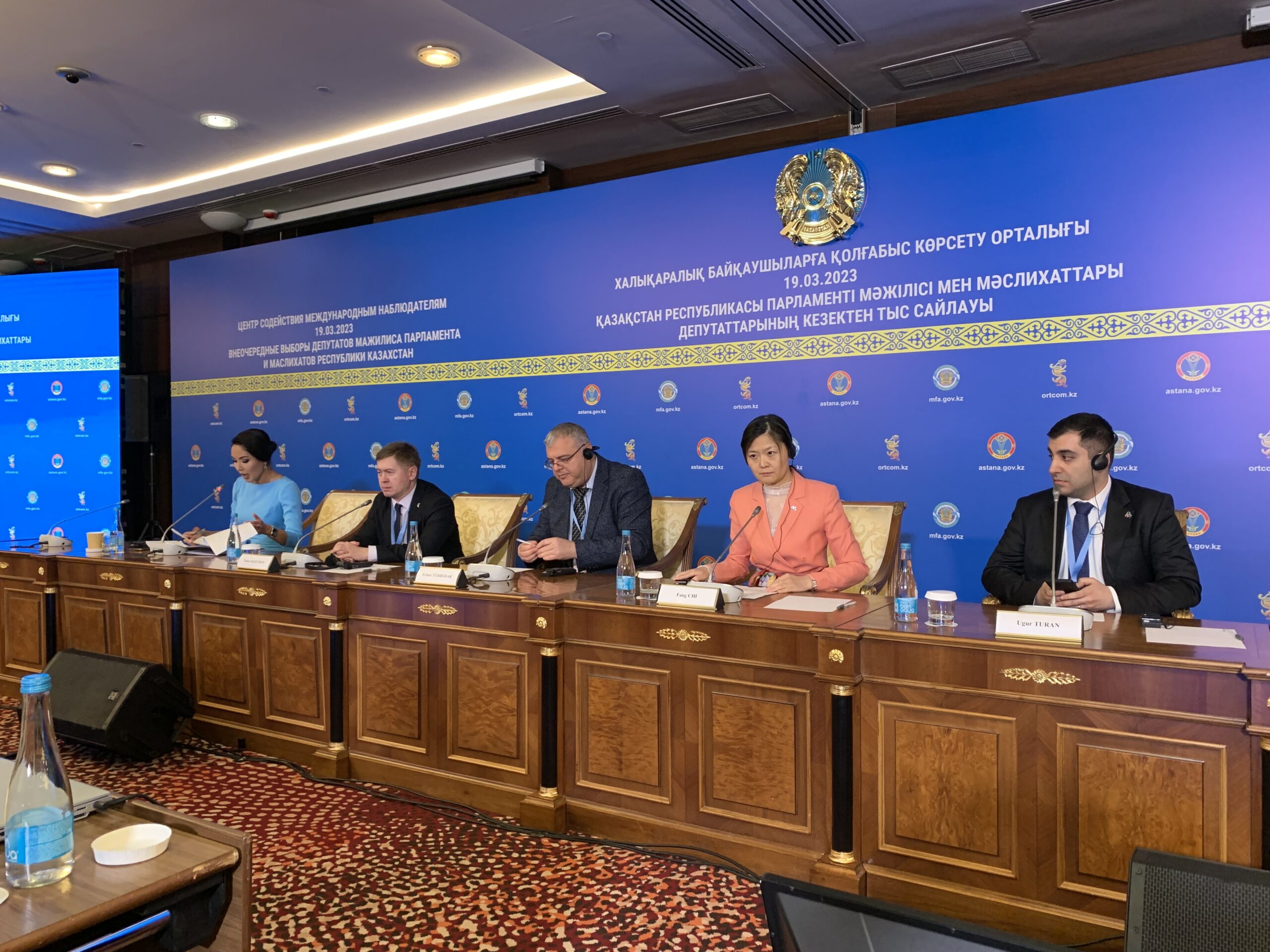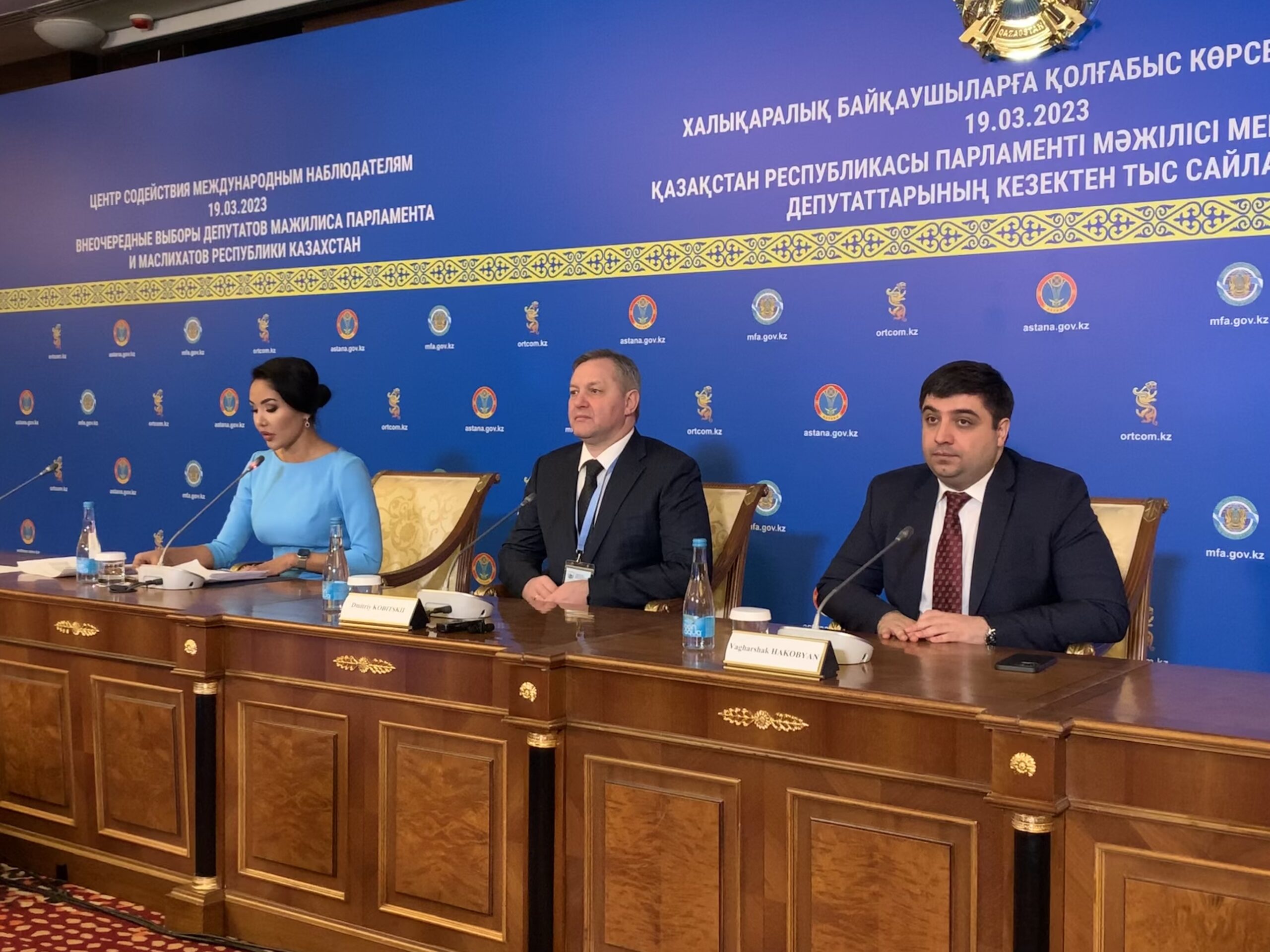ASTANA – Smooth organization and high voter turnout among the young people is how foreign observers describe Kazakhstan’s parliamentary election at a press briefing in Astana on March 19, saying there are no significant violations as of noon.

From left to right: International Turkic Academy observers Erhan Türbedar and Timur Kozyrev, and observers from CICA Fang Chi and Ugur Turan. Photo credit: The Astana Times.
Observers from the Interparliamentary Assembly of the Commonwealth of Independent States (CIS) reported active voter participation, particularly among the youth. Dmitriy Kobitskiy, Secretary General and head of the Secretariat of CIS Interparliamentary Assembly Council, said he witnessed people heading to polling stations as early as 7 a.m.
“In contrast to what we typically observe, when it is the adult population and the elderly who cast their ballots first, here, young people did so,” he said.
Kobitskiy said 61 short-term observers from their organization monitor the election in the cities of Kazakhstan and abroad at polling stations opened in the country’s diplomatic missions in several CIS countries, as well as in Belgium, China, France and South Korea.

Observers from the Interparliamentary Assembly of the CIS, Dmitriy Kobitskiy and Vagharshak Hakobyan. Photo credit: The Astana Times.
According to Vagharshak Hakobyan, deputy chairman of the standing committee of the National Assembly of the Republic of Armenia on Regional Issues and Eurasian Integration Issues, the CIS Interparliamentary Assembly observers recorded no serious violations up until the briefing.
“I would like to point out that the organizational level is, as usual, very high. Our observers say voter turnout is very considerable. I hope that when the polling stations close at the end of the day, we will see that these elections were an important advance towards democracy,” said Hakobyan.
The CIS observers also noted a festive atmosphere at the opening of polling stations, heralded by the national anthem and enthusiastic participation of Kazakh youth.
Rizvan Huseynov, head of the Center for the History of the Caucasus and an independent observer from Azerbaijan, witnessed a 10-12 percent turnout at the polling stations he visited in the morning, which he assessed as “very good” considering the weather conditions and the fact that it was a weekend.
According to him, an “against all” ballot safeguards the freedom of choice and expression of people.
“The fact that there is an ‘against all’ box where a person can express his or her position by saying that he does not agree with everyone on the list is very good. It is an indicator of democracy and the fact that people of all social strata are given the opportunity to express their opinions, even if they are negative,” said Huseynov.
His fellow observer from Georgia, Vakhtang Maisaia, a political scientist, an expert on security issues and a professor at the Caucasus International University, said Kazakhstan had surpassed many CIS countries on certain democratic processes. The introduction of the “against all” ballot is one of them. In his vast experience as an observer, he has not seen such a ballot before.
Vice President of the International Turkic Academy Erhan Türbedar said their mission did not observe any irregularities. He commended the preparations and the well-informed staff at the polling stations.
Fang Chi, deputy executive director of the Conference on Interaction and Confidence Building Measures in Asia (CICA) Secretariat, said the level of democracy in Kazakhstan is developing and political reforms are ongoing at the highest level.
When asked what had changed in the electoral process since the previous referendum and presidential election, she said there had been improvements in organizational procedures and more experienced voters, resulting in a smooth and orderly voting process.
“This is my second time as an observer. I think that in these two years, the elections are being held for the third time, making the organizers very experienced,” Chi told The Astana Times.
She added the citizens are also more experienced and well-informed when it comes to making their choices.
“For example, today, I noticed people studied and knew the candidates beforehand through different sources, social networks, and websites. They thought carefully beforehand and made their well-informed choice. Although this time there are four ballots, and some of them are very long, people made their choices quickly,” said Chi.

